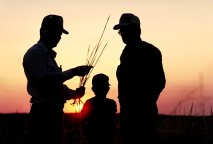|
|||
|
|
Farm Family Safety and Health Workshop Revised edition
Chapter 1: Setting Your GoalsWhen you first decide to organize a farm safety and health workshop, you need to develop some clearly defined goals for the program. Answering the following questions should assist you in defining these goals. Who is the intended audience? Who is the intended audience?Farm safety and health workshops can be targeted to farm operators of different ages, farm spouses, children, or the entire family. The topics to be covered and the method of teaching will vary for different target audiences. For family programs, remember that material directed toward children will also be understood by the adults, but not necessarily the other way around. Experience has shown that very successful programs can be designed for whole communities, but that programs targeting specific groups, such as spouses or children, are sometimes more effective. What topics do you want to cover?There is no way to cover all the potential topics concerning farm safety and health in a two-hour or three-hour session, or even in an all-day program. Choose one or a few specific topic areas to cover, such as machinery safety, child safety, harvest safety, health issues, or emergency response. By focusing on a few major points, you can be sure that the audience will gain useful knowledge in at least one area. A series of workshops scheduled over a two-year or three-year period can demonstrate a long-term commitment to improving the safety and health of farm families. See Chapter 2 for a more thorough discussion of selecting a program format. When will the program be held?The scheduling of a farm safety and health workshop depends on the topics you want to cover and the availability of your audience. Farm families are always busy, especially during the planting and harvest seasons. Unfortunately, these seasons are also the most dangerous times of the year on the farm. Many groups attempt to sponsor programs just prior to harvest or planting season to remind farm families of potential hazards they will face in the coming weeks. Farm families are also frequently involved in community activities such as school, church, or 4-H. Chances are good that a farm safety program scheduled for a Friday night in January will take second priority to the high school basketball game. And don't even think about scheduling a program for children just before the county fair when there are 4-H projects to finish. Where will the program be held?The program content and the audience are important considerations in selecting a location for your workshop. For farm machinery safety programs, an ideal location is an equipment dealership. The dealership will have machinery for demonstrations on site, and most equipment dealers are very receptive to this type of program. Many successful programs have been held on farms. A shop or machine shed is needed to house the workshop, as well as a willingness on the farmer's part to do a little extra work preparing for the guests. Avoid locations where distractions such as nearby traffic, poor lighting, or animal noises will keep participants from hearing clearly or being comfortable. Other potential locations include fairgrounds, or high school agricultural education shops and classrooms. These locations generally have excellent facilities, but you may need to bring equipment to the workshop. Chapter 3 provides more information to consider when selecting a workshop location. Due to growing concerns over potential liability issues, the property owner should check with his or her insurance carrier to determine whether or not insurance coverage includes public events such as a farm safety event. Some policies for farms do not cover activities such as hay wagon rides or corn mazes, and may not provide coverage for an event involving the general public. In some cases a low cost special events policy may be available. If coverage is not in place, it may be best to select a site with existing coverage such as a fairgrounds or public school. How are you going to do it?The key word in this question should be "we" not "you." Organizing any type of successful farm safety workshop requires the cooperation of individuals and groups within a community. A committee of several people can divide up responsibilities between them. For example, Joe is in charge of finding a location, Sally is responsible for refreshments and sponsors, Mary handles the publicity, and so on. Encouraging as many people as possible to take "ownership" in the program will increase the potential for success. See Chapter 5 for tips on gathering community support. Allow plenty of time before your proposed program to develop your goals, plan the program, and publicize the event. The most successful farm safety and health workshops require careful planning and preparation. Try to allow at least three months of preparation time between your first planning meeting and the event. To charge or not to charge?A growing number of organizers of farm safety programs are now charging a small fee to register for the event. This income helps defray some of the costs associated with conducting the program and communicates to the participants that the program has value. Typical charges have ranged from $5-15 and usually covers refreshments, a light lunch, a shirt or hat, and handouts. Confirming attendance by requiring a pre-registration fee helps estimate attendance and plan for resources that will be needed. At least a call-in pre-registration can prevent wasted staff time and expenses. Most program organizers have in place a policy that ensures that no one is turned away from the event due to the inability to pay the registration fee. Last updated: 18-May-2006 11:08 AM
|
||


 Designed and maintained by the
Designed and maintained by the